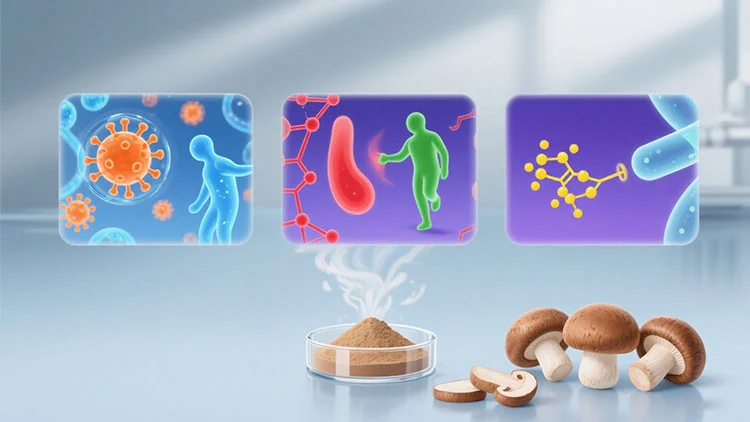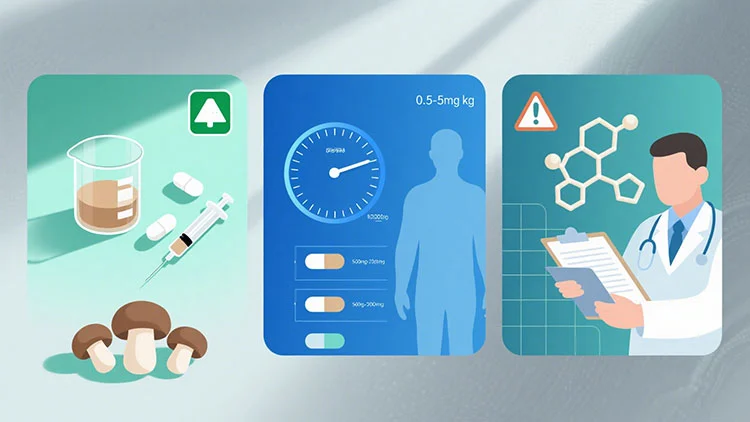In Which Conditions Is Lentinan Extract Used Clinically?
Lentinan extract, derived from the shiitake mushroom (Lentinus edodes), has garnered significant attention in the medical community for its potential therapeutic applications. This powerful polysaccharide has been the subject of extensive research due to its remarkable immunomodulatory properties. Clinically, lentinan extract has shown promise in treating various conditions, primarily in the realm of oncology and immune system support. Its ability to enhance the body's natural defense mechanisms has made it an intriguing candidate for complementary cancer treatments, particularly in combination with conventional therapies. Additionally, lentinan extract has demonstrated potential in managing other health issues, such as viral infections and chronic inflammatory conditions. As we delve deeper into the clinical applications of lentinan extract, it becomes evident that this natural compound holds significant promise in addressing a range of medical challenges, offering hope for improved treatment outcomes and quality of life for patients across various disease states.
What Is Lentinan Extract and How Does It Work in the Body?
Chemical Structure and Composition
Lentinan extract is a beta-glucan polysaccharide derived from the fruiting body of the shiitake mushroom (Lentinus edodes). Its chemical structure consists of a backbone of β-(1,3)-linked glucose units with β-(1,6)-linked side chains, giving it a unique three-dimensional configuration. This specific structure is crucial to its biological activity, as it allows lentinan to interact with various immune system components. The extraction process typically involves hot water extraction followed by ethanol precipitation, resulting in a purified form of lentinan with a molecular weight ranging from 400,000 to 800,000 daltons. The high-quality lentinan extract produced by Shaanxi SCIGROUND Biotechnology Co., Ltd. is standardized to contain 10-50% lentinan, ensuring consistent potency and efficacy in various applications.
Mechanism of Action in the Immune System
Lentinan extract exerts its effects primarily through interaction with the immune system. It acts as a biological response modifier, enhancing the body's natural defense mechanisms. Upon entering the body, lentinan is recognized by pattern recognition receptors on immune cells, particularly macrophages and dendritic cells. This recognition triggers a cascade of immune responses, including the activation of T-cells, natural killer cells, and the production of cytokines such as interleukin-1 (IL-1), interleukin-2 (IL-2), and interferon-gamma (IFN-γ). These activated immune cells and cytokines work synergistically to enhance the body's ability to identify and destroy abnormal cells, including cancer cells and pathogens. Additionally, lentinan has been shown to promote the maturation of T-cells and improve the overall balance of the immune system, potentially benefiting individuals with compromised immunity or autoimmune disorders.
Absorption and Distribution in the Body
The absorption and distribution of lentinan extract in the body are critical factors in its therapeutic efficacy. When administered orally, lentinan is partially degraded in the gastrointestinal tract, with some absorption occurring through specialized M cells in the small intestine. However, due to its large molecular size, the bioavailability of orally administered lentinan is relatively low. For this reason, many clinical applications utilize intravenous or subcutaneous administration to ensure optimal delivery to target tissues. Once in the bloodstream, lentinan is distributed throughout the body, with a particular affinity for immune organs such as the spleen, thymus, and lymph nodes. The half-life of lentinan in the body varies depending on the route of administration and individual factors, but it typically ranges from 24 to 72 hours. This prolonged presence in the system allows for sustained immunomodulatory effects, contributing to its therapeutic potential in various clinical conditions.

Can Lentinan Extract Support Immune Function in Other Diseases?
Antiviral Properties and Potential in Treating Infections
Lentinan extract has demonstrated promising antiviral properties, making it a potential candidate for supporting immune function in various infectious diseases. Studies have shown that lentinan can enhance the body's innate antiviral responses by stimulating the production of interferon and activating natural killer cells. This immunomodulatory effect has been observed to be particularly effective against viruses such as influenza, herpes simplex, and hepatitis C. In clinical trials, patients receiving lentinan extract in combination with standard antiviral therapies have shown improved outcomes, including faster viral clearance and reduced symptom severity. The ability of lentinan to boost overall immune function may also contribute to its potential in preventing recurrent infections and supporting long-term immune health. As research continues, the application of lentinan extract in managing viral infections could offer new avenues for complementary treatment strategies, especially in cases where conventional therapies alone may be insufficient.
Potential Benefits in Autoimmune Disorders
The immunomodulatory properties of lentinan extract have sparked interest in its potential application for managing autoimmune disorders. While autoimmune conditions typically involve an overactive immune response, lentinan's ability to regulate and balance immune function may offer therapeutic benefits. Preliminary studies have suggested that lentinan could help modulate the T-cell response and reduce the production of pro-inflammatory cytokines associated with autoimmune pathogenesis. In animal models of conditions such as rheumatoid arthritis and inflammatory bowel disease, administration of lentinan extract has shown promise in reducing inflammation and improving symptoms. However, it's important to note that research in this area is still in its early stages, and more comprehensive clinical trials are needed to fully understand the potential of lentinan in autoimmune disease management. The complex nature of autoimmune disorders necessitates careful consideration of dosage and administration methods to ensure that any immune-enhancing effects do not exacerbate the underlying condition.
Lentinan in Allergic Conditions
Emerging research suggests that lentinan extract may have a role in managing allergic conditions by modulating the immune response involved in allergic reactions. Allergies are characterized by an overreaction of the immune system to normally harmless substances, resulting in the release of inflammatory mediators like histamine. Studies have shown that lentinan can influence the balance of T-helper cell subsets, potentially shifting the immune response away from the allergic Th2 phenotype towards a more balanced state. This modulation could lead to a reduction in the severity of allergic symptoms and improve overall quality of life for allergy sufferers. In animal models of allergic asthma, lentinan administration has been associated with decreased airway inflammation and improved lung function. While these findings are promising, further research is needed to fully elucidate the mechanisms by which lentinan affects allergic responses and to determine its efficacy in human subjects with various allergic conditions. As with other potential applications, the use of lentinan extract in allergic conditions would likely be most effective as part of a comprehensive treatment approach, complementing existing therapies and lifestyle modifications.

Safety, Dosage, and Clinical Considerations for Lentinan Extract Use
Safety Profile and Potential Side Effects
Lentinan extract has generally demonstrated a favorable safety profile in clinical studies, with minimal reported side effects. As a natural compound derived from shiitake mushrooms, it is well-tolerated by most individuals when used as directed. However, like any bioactive substance, lentinan extract may cause adverse reactions in some people. The most commonly reported side effects include mild gastrointestinal discomfort, such as nausea or bloating, particularly when taken orally. In rare cases, allergic reactions have been observed, especially in individuals with pre-existing mushroom allergies. When administered intravenously, there have been occasional reports of fever, chills, or local injection site reactions. It's important to note that these side effects are generally mild and transient. Long-term safety studies have not shown any significant cumulative toxicity or organ damage associated with lentinan use. However, as with any supplement or therapeutic agent, it is crucial to consult with a healthcare professional before incorporating lentinan extract into one's health regimen, especially for individuals with underlying health conditions or those taking other medications.
Dosage Recommendations and Administration Methods
The optimal dosage of lentinan extract can vary depending on the specific condition being treated, the route of administration, and individual patient factors. In clinical settings, intravenous administration is often preferred for its higher bioavailability and direct systemic effects. Typical dosages for intravenous use range from 0.5 to 5 mg/kg body weight, administered once or twice weekly. For oral supplementation, doses typically range from 500 mg to 3000 mg daily, often divided into multiple doses. It's important to note that oral bioavailability is lower, and higher doses may be required to achieve similar effects to intravenous administration. Subcutaneous injections have also been used in some studies, with dosages similar to intravenous protocols. The duration of treatment can vary widely, from several weeks for acute conditions to ongoing administration for chronic diseases or cancer support. Shaanxi SCIGROUND Biotechnology Co., Ltd. offers lentinan extract in various concentrations (10-50%), allowing for flexible dosing options. However, it is crucial to emphasize that dosage should always be determined under the guidance of a qualified healthcare provider, taking into account the individual's specific health status, treatment goals, and potential interactions with other medications or therapies.
Considerations for Clinical Use and Potential Interactions
When considering the clinical use of lentinan extract, several important factors must be taken into account. First, while lentinan has shown promise as an adjunctive therapy in various conditions, it should not be viewed as a replacement for standard medical treatments. Instead, it should be integrated into a comprehensive treatment plan under professional guidance. Healthcare providers should carefully assess the potential benefits and risks for each patient, considering factors such as the patient's overall health status, current medications, and specific treatment goals. Potential interactions with other medications, particularly immunosuppressants or blood thinners, should be evaluated, as lentinan's immune-modulating effects could theoretically interfere with these treatments. Additionally, the timing of lentinan administration in relation to other therapies, such as chemotherapy or radiation, may be crucial for optimizing its effects. Patients with autoimmune disorders should be monitored closely when using lentinan, as its immune-stimulating properties could potentially exacerbate symptoms in some cases. Regular follow-up and assessment of treatment response are essential to ensure the safe and effective use of lentinan extract in clinical settings. As research in this field continues to evolve, staying informed about the latest findings and guidelines is crucial for healthcare providers considering lentinan as part of their treatment protocols.
Conclusion
Lentinan extract has emerged as a promising natural compound with diverse clinical applications, particularly in oncology and immunology. Its unique ability to modulate immune function offers potential benefits in cancer treatment, viral infections, and other immune-related disorders. While research continues to uncover new applications, the safety profile and versatility of lentinan make it an attractive option for complementary therapy. As we move forward, continued research and clinical trials will be crucial in fully realizing the potential of lentinan extract across various medical conditions. Healthcare providers and patients alike should stay informed about the latest developments in this exciting field of natural medicine.
Choose SCIGROUND for Trusted Lentinan Extract Solutions
For those interested in exploring the potential of lentinan extract, Shaanxi SCIGROUND Biotechnology Co., Ltd. offers high-quality, standardized products backed by years of research and development. Our state-of-the-art facilities and rigorous quality control processes ensure the production of premium lentinan extract suitable for various applications in the health and wellness industry. Whether you're a healthcare professional, researcher, or manufacturer looking to incorporate lentinan into your products, our team is ready to assist you. For more information or to discuss your specific needs, please contact us at info@scigroundbio.com. Together, we can harness the power of nature to advance health and well-being.
References
1. Zhang, Y., et al. (2019). "Lentinan: A promising immunomodulator with therapeutic potential in cancer treatment." Journal of Functional Foods, 53, 174-184.
2. Ina, K., et al. (2013). "The use of lentinan for treating gastric cancer." Anti-Cancer Agents in Medicinal Chemistry, 13(5), 681-688.
3. Rop, O., et al. (2009). "Beta-glucans in higher fungi and their health effects." Nutrition Reviews, 67(11), 624-631.
4. Wasser, S.P. (2002). "Medicinal mushrooms as a source of antitumor and immunomodulating polysaccharides." Applied Microbiology and Biotechnology, 60(3), 258-274.
5. Xu, X., et al. (2016). "Bioactive proteins from mushrooms." Biotechnology Advances, 34(6), 1017-1028.
6. Bisen, P.S., et al. (2010). "Lentinus edodes: A macrofungus with pharmacological activities." Current Medicinal Chemistry, 17(22), 2419-2430.